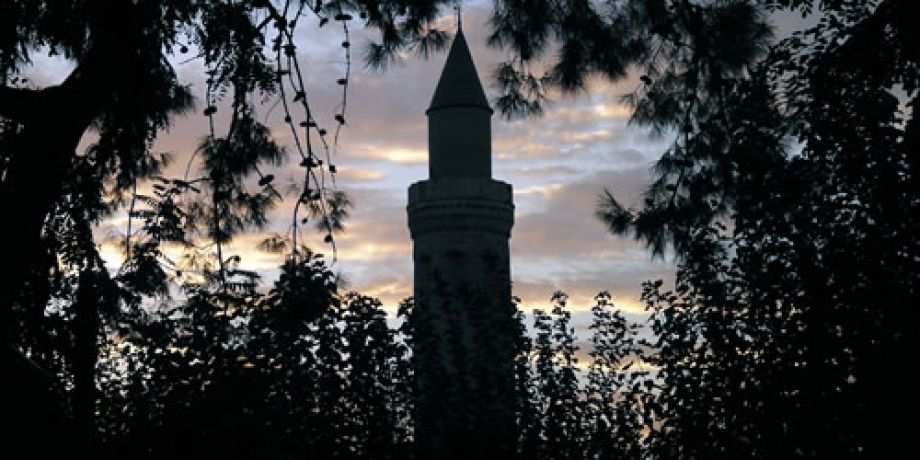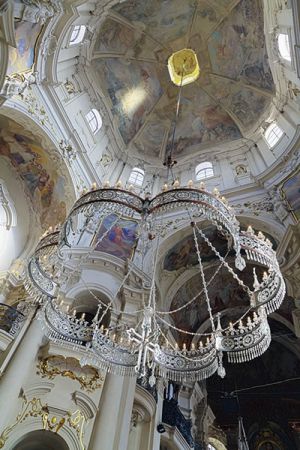
... to the Churches and Bells in Rome
After 34 years of missionary work in Pakistan, I came to Rome at the end of 2011 to serve as the procurator-general of the Missionary Society of St. Columban. The Columbans have a residence in Rome called Collegio San Colombano for priests who are studying in Rome, for those who have official business and also for visitors. This is where I live.

The first and most important role in Rome of the procurator-general of any religious society or congregation is to represent the superior-general and his council at the various Vatican offices. Our Columban superior-general lives in Hong Kong, so I facilitate any matters between the Vatican and him. I also assist some of the dioceses where Columbans are working or which have had long missionary connections with Columbans. Columbans have worked in the Philippines since 1927 and have a good relationship with the Mission Society of the Philippines which was founded fifty years ago. As part of this relationship I am also the procurator general of this Mission Society of the Philippines. One of the very good effects of the pontificate of Pope Francis has been a fresh commitment and readiness of the clerical and lay officials in the Vatican offices [called dicasteries or the Curia] to deal quickly and efficiently with matters which are brought before them. This makes my work pleasant. It is good to collaborate with these officials in friendship and with a common vison to serve the needs of the Church throughout the world.
The Columbans are not a big society. However, when speaking to people in Rome who are in leadership of much larger religious orders, congregations and societies I have been surprised to realize the importance and quality of the sharing that Columbans are able to do about important issues which have come from our missionary experience in many countries. On behalf of our superior general I have presented to Vatican offices the Columban policies on socially responsible and ethical investment, climate change, migrants, and inter-religious dialogue. The response has been one of genuine appreciation for well-presented statements on key moral and missionary issues, some of which are still being worked upon by the Vatican and other religious congregations.
My working contact in Rome as procurator-general with men and women of many nationalities in leadership positions of religious congregations and societies has helped me understand the huge international network of faith and ministry in the Catholic Church. I had taught about this as an historic reality in my church history courses at the major seminary in Karachi. I am now experiencing it as an actual present-day reality. Meetings, conferences, liturgies, and gatherings in friendship are occasions for crossing boundaries of culture, race and language. This is made easier by the fact that we share the one faith and also because we speak Italian as our new common language whether we are from China, Malawi, India, Australia, or France.
Being in Rome has been an opportunity for me to develop close ecumenical relations with the Anglican and Methodist Churches. The Archbishop of Canterbury has his personal representative to the Holy See as does the World Methodist Federation. My commitment to ecumenism is something I received from my parents. Although it hardly appears on the official Columban "home page" I believe that it is difficult to be a missionary and ignore the ecumenical challenge and possibilities for collaboration for justice and peace, for human rights and religious freedom, in interreligious dialogue, and against human trafficking and slavery. Through the ecumenical hospitality of Archbishop Justin Welby, I arranged for Cardinal George Pell to celebrate Mass on July 7, 2015, at the main altar in Canterbury Cathedral. This was the first time since the Reformation. In January 2016, in collaboration with the Anglican Center in Rome, with the approval of two Italian government ministries and of one Vatican office, and with the assistance of the British Embassy to the Holy See, I carried the crozier associated with Pope St. Gregory the Great from Rome to Canterbury. It was St. Gregory who sent St. Augustine of Canterbury to evangelize the English in 596. The occasion for taking his crozier to Canterbury was a "make-or-break" meeting of all the senior Anglican archbishops called by the Archbishop of Canterbury to deal with serious doctrinal and moral issues. The crozier was a symbol of the support in prayer and hope of Rome for the Anglicans. For them it was a reminder from history of what they possessed together as Anglicans in faith, spirituality, tradition, and missionary endeavour especially in Africa.
Following this, Pope Francis and Archbishop Welby met in the basilica of St. Gregory in Rome on October 5, 2016. Pope Francis gave Archbishop Welby a replica of St. Gregory's crozier which the archbishop now uses in Canterbury Cathedral and Archbishop Welby gave the Holy Father his pectoral cross. During this same ceremony, Pope Francis and the archbishop commissioned a Catholic bishop and an Anglican bishop from nineteen countries to work together in ecumenical collaboration in their own country. Two bishops from Pakistan were included; I taught the Catholic bishop when he was a seminarian and count the Anglican bishop as a good friend. After a proposal I made that Anglican Evensong be celebrated in St. Peter's basilica, the ceremony took place on March 13, 2017, at the Altar of the Chair immediately behind the papal altar. It was presided over by an Anglican archbishop, the sermon was preached by a Catholic archbishop, and the music was provided by the choir of Merton College, Oxford. This was the first Anglican or Protestant act of worship ever celebrated in St. Peter's and refl ected the ecumenical hope expressed by Pope Francis during his recent visit to Sweden: "We are still not one but let us act as if we will be one." I have nurtured excellent bonds in action, prayer and friendship with the Methodist Center in Rome and have been able to connect it with the Justice and Peace and Inter-Religious Dialogue Commissions of the Unions of Superior Generals.
Meeting ambassadors accredited to the Holy See has created fruitful points of contact especially in the countries where Columbans are present. In 2016 the Irish ambassadors to the Holy See and to Italy joined the celebration in Rome of the 100th anniversary of the Easter uprising in Dublin with the 100th anniversary of the Columbans receiving approval from bishops in Ireland to begin their missionary work in China. Good contacts with the diplomats means that issues of Columban concern can be effectively presented and often visa difficulties for missionaries can be resolved. I maintain excellent contacts with the Pakistan ambassadors to the Holy See and to Italy. I assist them in making their view heard in the Vatican offices. I am able, in turn, to insist to them on issues relating to human rights, religious freedom, and the blasphemy laws which threaten Christians and others. It is a relationship of respect and understanding.
Being procurator-general for the Columbans is an interesting position with many possibilities for furthering the work of our Society and making the Society better known on the international level. These are some of the possibilities that I have been able to make realities.
Columban Fr. Robert McCulloch lives and works in Rome, Italy.